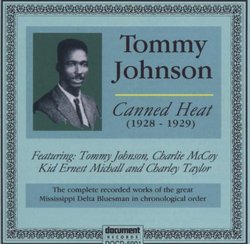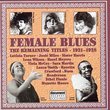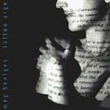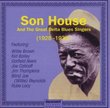| All Artists: Tommy Johnson Title: 1928-1929 Complete Recorded Works Members Wishing: 4 Total Copies: 0 Label: Document Original Release Date: 1/1/2028 Re-Release Date: 5/27/1994 Album Type: Import Genres: Blues, Pop Styles: Delta Blues, Traditional Blues, Acoustic Blues Number of Discs: 1 SwapaCD Credits: 1 UPCs: 714298500127, 788518500129, 034742705329, 669910022054 |
Search - Tommy Johnson :: 1928-1929 Complete Recorded Works
 | Tommy Johnson 1928-1929 Complete Recorded Works Genres: Blues, Pop
Evidence of the strange genius of Mississippi bluesman Tommy Johnson is limited to 17 recordings from two late-1920s sessions. It is the first of these, for the Victor Company, that produced the recordings upon which ... more » |
Larger Image |
CD DetailsSynopsis
Amazon.com Evidence of the strange genius of Mississippi bluesman Tommy Johnson is limited to 17 recordings from two late-1920s sessions. It is the first of these, for the Victor Company, that produced the recordings upon which Johnson's lofty reputation rests. Sung in a husky falsetto, somewhere between an African field holler and an Alpine yodel, "Cool Drink of Water Blues" stands atop a pinnacle in the richly inventive Delta blues tradition with younger cousin Robert Johnson's "Hellhound on My Trail" and Skip James's "Devil Got My Woman." "Canned Heat Blues" is a bittersweet paean to the older Johnson's penchant for imbibing tins of jellied kerosene, and was a modest hit in that era's "race record" market. Also notable from his 1928 session were the influential "Maggie Campbell Blues," "Big Road Blues," and "Big Fat Mama Blues," while the recently discovered Paramount session was remarkable for "Slidin' Delta" and "I Wonder to Myself." --Alan Greenberg Similar CDs
|
CD ReviewsAn Intimate Glimpe at the Artistry of Tommy Johson Todd Entenman | Waterville, OH | 10/07/2002 (5 out of 5 stars) "The stories surrounding Tommy Johnson have made him, in my humble opion, one of the most intriguing recording artists from the late 1920's. The term 'canned heat', of course, refers to the alcohol contained in shoe polish, cooking fuel, hair tonic, etc. History (in addition to Tommy himself) tells us that Tommy Johnson strained the aforementioned products (alcorub) through bread and consumed them (one would assume) orally. He was severely addicted to the stuff. Then there is the Faustian story about Tommy Johnson selling his soul at the crossroads. Robert Johnson's name will be forever connected with this story, though it was told about Tommy a decade earlier.This cd is perhaps the finest collection of recorded works (featuring a single artist) that I have ever heard. The first 8 songs are Victor Recordings. They are well documented (date, location of recording session, performers involved, etc.) and preserved very nicely. Songs 9-17 were recorded by Paramount, and the sound quality suggests that the masters were used at one time to line chicken coops. The Paramount Company did good for recording Johnson, but the surviving masters and documentation on the recording sessions are disappointing to say the least. The sound flaws can't diminish the spirit of Johnson's music though, and should do little to deter the serious listener from enjoying them immensely. I consider this Document Record an abolute must listen, as well as an indispensible piece in the cd collection of any serious blues fan and/or musician. In 17 tracks (roughly three minutes long each), the listener is not only treated to sincere and spontaneous performances (each one a classic), he/she is also given an intimate glimpse into the life of an absolutely incredible songwriter, guitarist, and performer." Robert Johnson may not be the most important Johnson? Todd Entenman | 04/14/2000 (5 out of 5 stars) "In no way do I mean to disparage the revered, and rightly so, Mr.Robert Johnson. There is however another Mr.Johnson with equal or perhaps more passion and ferocity. His name is Tommy, and like Robert, his recorded output is woefully lacking. Mainly caused by the era's recording technology, partly by his own disinterest in recording and his preoccupation with the ingestion of spirits. I believe the seventeen songs on this album are all the songs he ever recorded. But they are seventeen slices of Heaven or Hell, as the case may be. Aside from Robert, I can think of few artists ever, to so clearly and effectively display such raw, painful and pure emotion. The proverbial deal with the Devil originated with this Mr.Johnson and not Robert. Judging from the sound of his voice on these recordings he may have actually gone for a visit before coming back and cryptically relaying his torment to us through song. I cannot recommend this masterpiece more strongly than to say thank God/the Devil for Mr.Tommy Johnson and his seventeen slices of Heaven/Hell." Essential! Docendo Discimus | Vita scholae | 04/12/2004 (5 out of 5 stars) "Before Robert Johnson came along, and long before Son House started spreading the rumour that he (Johnson) had sold his soul to the devil in exchange for his abilities on the guitar, a man fifteen years Robert Johnson's senior ever so often implied that his immense talent came as the result of a midnight deal with Old Scracth.Thomas Johnson was born in 1896 down in the Mississippi Delta, and though his name is not as well known as those of Charlie Patton, Son House, and Robert Johnson (no relation), he was one of the most important prewar bluesmen, and certainly one of the most talented.
He was also an uncontrolled alcoholic, and the fact that he lived to see sixty is something of a miracle. His "Canned Heat Blues" is certainly autobiographical, and his contemporaries have told about Johnson straining shoe polish through a slice of white bread in order to extract the alcohol. But his music is something to behold. Johnson sounds totally immersed in it, his voice possessing an eerie quality enhanched by his occational falsetto moans, and this disc includes the original versions of "Maggie Campbell Blues", "Big Road Blues", and "Cool Drink Of Water Blues" (later recorded by Howlin' Wolf as "I Asked For Water (she gave me gasoline)").Johnson plays alone on a few songs, but on most of these seventeen sides (which comprise his entire recorded legacy) he is backed by one or more additional musicians, most often a second guitarist. The first eight sides, Tommy Johnson's Victor sides from 1928, boast amazing sound quality...much (much!) better than Charlie Patton's or Son House's contemporary recordings, they're clean and crisp with just a little static, and every phrase and every instrument is clearly heard. Johnson was a talented and quite original guitar player, and it is a delight to be able to hear him so well.The Paramount sides, on the other hand, are...well, Paramount sides. Much inferior in sound quality to the Victor sides, they are nevertheless well worth a listen, particularly "Alcohol And Jake Blues" and the battered "Lonesome House Blues". On the best of these songs, Johnson's voice is positively frightening, and his "Cool Drink Of Water" is the sound of pure despair. This is some of the starkest, most powerful music you'll ever hear." |

 Track Listings (15) - Disc #1
Track Listings (15) - Disc #1


